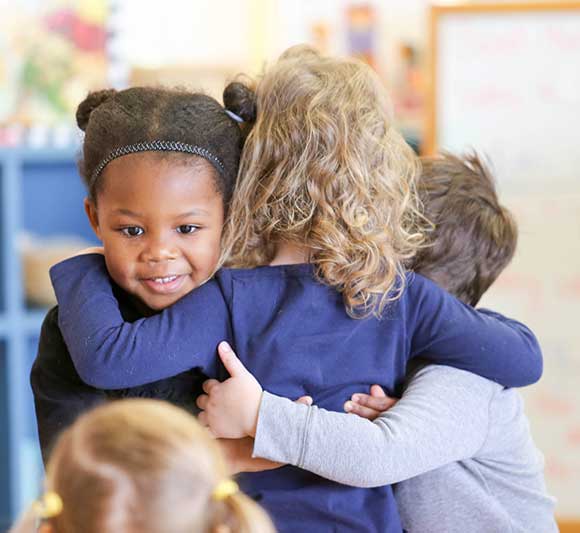
Conflict Resolution in Preschool
From the desk of Lower School Director Kelly Banik
Preschool Conflict is Normal but Complex
With the start of the school year behind us, the children are settling into their studies and finding ways to connect with each other and the curriculum in deeper and more meaningful ways. As the children seek to build relationships with each other, it’s very normal for conflicts and hurt feelings to arise. The skills needed for resolving conflict effectively, especially for preschool, prekindergarten, and kindergarten age students, are essential for emotional health—and these skills are complex, involving managing feelings, communicating effectively, developing options and making decisions. All caregivers (teachers and families) play a critical role in establishing positive guidance that teaches children the skills needed to resolve conflicts effectively.
Preschool Conflict Resolution Strategies for Parents
Below are some suggestions (compiled from several child psychologists and educational experts) for ways to develop essential conflict resolution skills in your preschool, prekindergarten, and kindergarten age children.
- Reassure your child that conflicts are a normal part of relationships and express confidence that s/he can work things out.
- When your child is upset, listen to his/her woes all the way through, without interrupting. Realize that you child may be describing how s/he felt about what happened, rather than providing a detailed account of what happened with 100% accuracy.
- Don’t interview for pain. Michael Thompson, New York Times best-selling author and psychologist encourages parents not to keep asking their children questions about who did what to whom. He suggests this doesn’t help and it actually stirs up their feelings — and yours. A better focus is helping your children learn to take care of themselves.
- A quick story about your own experience with difficult friendship moments can be validating.
- Encourage your child to be honest with friends, such as by expressing feelings without fear. Role play with your child so s/he can experience this honesty firsthand.
- Don’t tell your child exactly what to do. Help your child figure out a solution. Feel free to propose ideas, but allow your child to select a solution s/he feels most comfortable with. “What did you try?” “How did it work?” “What else can you try?”
- Don’t call other parents or ask the teacher to fix the friendship issue. The ultimate goal is to empower your child with the conflict resolution skills needed to navigate relationships successfully—not to have you or the teacher solve the problem for him/her.
For more information, please feel free to visit these resources:
- American Academy of Pediatrics, Everybody Gets Mad: Helping Your Child Cope with Conflict
- Women’s and Children’s Health Network, Conflict Resolution
- Illinois Early Learning Project, Helping Young Children Resolve Conflicts
- PBS Parents, Helping Preschoolers Resolve Social Conflicts
Kelly Banik has served as the Lower School Director at Moorestown Friends School since 2005 and oversees Preschool – Grade 4. In addition to her administrative work, Kelly has taught at the elementary, middle, undergraduate, and graduate levels. For over 20 years she has worked with educators on topics including curriculum design/mapping, instructional methods, classroom management, and professional growth. She has completed all coursework for a Ph.D. from the University of Delaware, has an M.A. in Cognition and Instruction from the University of Delaware, and has a B.A. from Drew University. For more information, see her bio here.
Schedule a Visit with Us
Learn more by a visit in person and meet with one of our excellent Early Childhood Program teachers.
